-
 Bitcoin
Bitcoin $99,468.4344
2.10% -
 Ethereum
Ethereum $2,838.8981
3.47% -
 XRP
XRP $2.7089
0.42% -
 Tether USDt
Tether USDt $1.0004
0.01% -
 BNB
BNB $666.9747
2.65% -
 Solana
Solana $180.2041
3.94% -
 USDC
USDC $1.0000
0.00% -
 Dogecoin
Dogecoin $0.2608
2.70% -
 Cardano
Cardano $0.8149
3.45% -
 TRON
TRON $0.2476
2.87% -
 Chainlink
Chainlink $19.0162
5.01% -
 Sui
Sui $3.5596
8.38% -
 Avalanche
Avalanche $26.4313
7.52% -
 Stellar
Stellar $0.3462
1.10% -
 Litecoin
Litecoin $138.8683
8.27% -
 Hedera
Hedera $0.2296
4.92% -
 Shiba Inu
Shiba Inu $0.0...01595
3.58% -
 Toncoin
Toncoin $3.6907
3.03% -
 UNUS SED LEO
UNUS SED LEO $9.7498
0.37% -
 Hyperliquid
Hyperliquid $25.4285
3.36% -
 Polkadot
Polkadot $5.3046
6.86% -
 MANTRA
MANTRA $7.5663
1.81% -
 Bitcoin Cash
Bitcoin Cash $332.9317
3.34% -
 Ethena USDe
Ethena USDe $1.0000
0.06% -
 Bitget Token
Bitget Token $4.8667
11.49% -
 Uniswap
Uniswap $9.6079
4.45% -
 Dai
Dai $1.0001
-0.02% -
 Monero
Monero $236.4426
2.66% -
 NEAR Protocol
NEAR Protocol $3.6058
9.66% -
 Pepe
Pepe $0.0...01011
7.06%
How is DeFi's leveraged trading implemented?
In DeFi, leveraged trading employs collateralization and margin requirements to trade with borrowed funds, amplifying both potential gains and losses while requiring meticulous risk management strategies.
Feb 17, 2025 at 10:54 am

Key Points:
- Leveraged trading magnifies potential gains and losses in DeFi.
- Collateralization ensures positions are liquidatable if excessive losses occur.
- Margin requirements vary depending on the asset and platform.
- Margin trading occurs through peer-to-peer lending pools or liquidity protocols.
- Risk management strategies include hedging, stop-loss orders, and position monitoring.
How is DeFi's Leveraged Trading Implemented?
1. Collateralization
- Provides a cushion to prevent losses beyond initial investment.
- Assets locked as collateral are held in a smart contract.
- Collateralization levels vary based on the underlying asset's volatility.
2. Margin Requirements
- Determine the ratio of borrowed funds to collateral provided.
- Higher margin requirements signify a lower risk profile.
- Lenders set margin requirements to manage their potential losses.
3. Borrowing
- Leveraged trading platforms offer lending pools or liquidity protocols.
- Users can borrow funds from these pools against their collateral.
- Interest rates and loan terms may vary depending on the platform.
4. Trading with Leverage
- Borrowed funds enable traders to increase their position size.
- Leverage amplifies both potential profits and risks.
- Traders can speculate on the appreciation or depreciation of various crypto-assets.
5. Liquidation
- If a trader's position incurs excessive losses, it may be liquidated.
- Liquidation ensures market stability and protects lenders from default.
- Specific criteria trigger liquidation, generally based on collateralization levels.
6. Risk Management Strategies
- Hedging using opposing positions to mitigate volatility.
- Setting stop-loss orders to automatically exit positions at predetermined levels.
- Regularly monitoring positions to assess liquidity and potential liquidation risk.
FAQs:
Q: How do I choose the right platform for leveraged trading?
- Consider factors such as margin requirements, interest rates, trading fees, and risk management tools.
Q: What are the differences between centralized and decentralized platforms?
- Centralized platforms are more regulated, while decentralized platforms offer greater anonymity and censorship resistance.
Q: What is the role of liquidity providers in leveraged trading?
- Liquidity providers deposit funds into lending pools, enabling traders to borrow leverage. They earn interest on their deposited assets.
Q: What are the benefits of leveraging in DeFi?
- Amplifies potential gains, enables speculative trading, and allows for capital efficiency.
Q: What are the risks of leveraged trading?
- Potential for excessive losses exceeding initial investment, liquidation risk, and unpredictable price movements.
Q: How can I minimize risks in leveraged trading?
- Practice proper risk management, understand the underlying assets, and carefully consider trading strategies.
Disclaimer:info@kdj.com
The information provided is not trading advice. kdj.com does not assume any responsibility for any investments made based on the information provided in this article. Cryptocurrencies are highly volatile and it is highly recommended that you invest with caution after thorough research!
If you believe that the content used on this website infringes your copyright, please contact us immediately (info@kdj.com) and we will delete it promptly.
- Mutuum Finance (MUTM): A New Contender in the Crypto Market Priced Below $0.02 Is Rapidly Gaining Ground
- 2025-02-21 21:35:24
- Panshibi (SHIBI) gains momentum as the most anticipated meme coin for 2025
- 2025-02-21 21:35:24
- Can Ozak AI (OZ) Surpass Meme Coins Like Shiba Inu (SHIB) and Dogecoin (DOGE) in Profits by 2025?
- 2025-02-21 21:35:24
- American Citizens May Soon Receive a $5K 'DOGE Dividend' From the U.S. Government
- 2025-02-21 21:35:24
- PepeGPT ($PEPEAI) – The AI-Powered Meme Coin Primed to Explode 100x
- 2025-02-21 21:35:24
- Dogecoin News Spread a Significant Movement, Which Caused Strong Reactions Among Cryptocurrency Enthusiasts
- 2025-02-21 21:25:24
Related knowledge
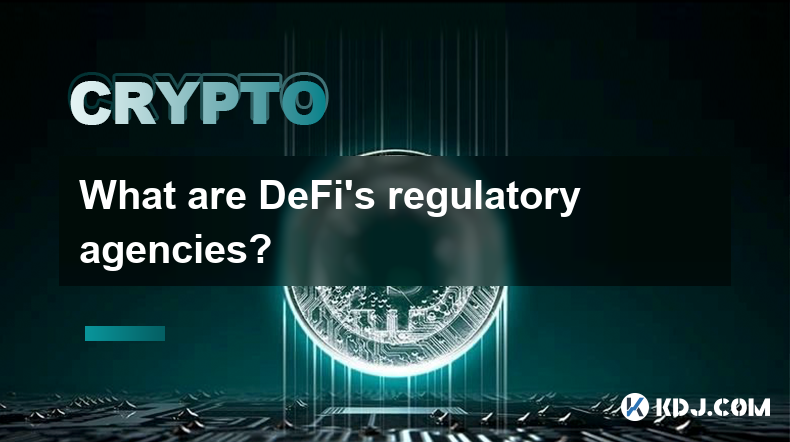
What are DeFi's regulatory agencies?
Feb 16,2025 at 05:18am
Key Points:DeFi: Definition, Architecture, and Regulatory ChallengesRole of Decentralized Autonomous Organizations (DAOs) in Self-RegulationLegal Frameworks for DeFi in the United States and European UnionInternational Cooperation and the Global DeFi Regulatory LandscapeJurisdictional Issues and Considerations for DeFi EntitiesEnforcement Actions and Li...
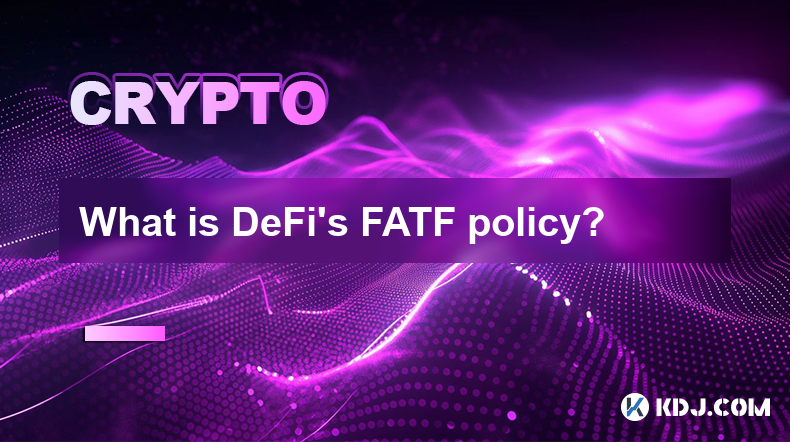
What is DeFi's FATF policy?
Feb 17,2025 at 08:06am
DeFi's FATF Policy: A Comprehensive GuideKey Points:FATF's Definition of Virtual Assets and VASPsFATF's Recommendations for DeFi PlatformsFATF's Travel Rule and its Implementation in DeFiThe Impact of FATF's Policy on DeFi AdoptionFAQs about DeFi's FATF PolicyFATF's Definition of Virtual Assets and VASPsThe Financial Action Task Force (FATF) is an inter...
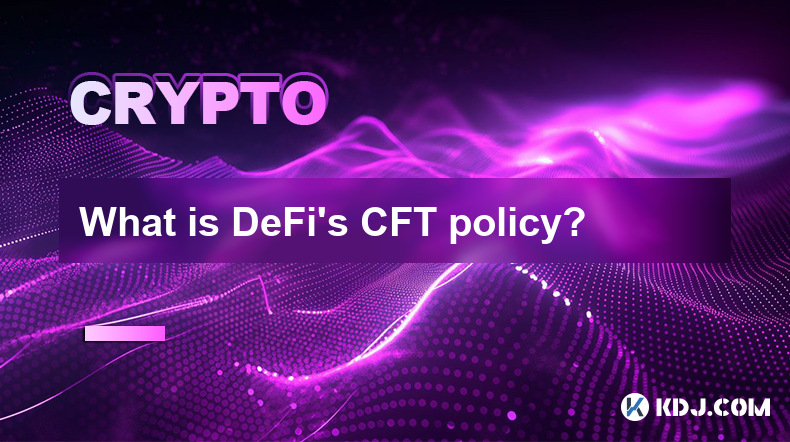
What is DeFi's CFT policy?
Feb 16,2025 at 11:54am
Key Points:Understanding CFT and its Significance in DeFiRegulatory Framework and KYC in DeFiImplementing AML/CFT Measures in DeFiProtocolsRole of Smart Contracts and Blockchain AnalysisChallenges and Future Developments in DeFi's CFT PolicyUnderstanding CFT and its Significance in DeFiCounter-Financing of Terrorism (CFT) is a crucial aspect of the cryp...
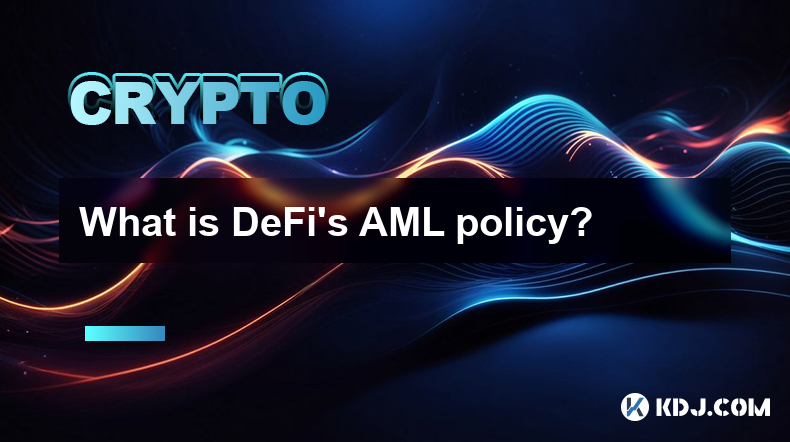
What is DeFi's AML policy?
Feb 15,2025 at 07:48pm
DeFi's AML Policy: Enhancing Compliance in the Crypto EcosystemKey Points:Understanding the Need for AML/CFT Compliance in DeFiChallenges and Limitations of DeFi AML PoliciesDecentralized Identity and Verification SolutionsSmart Contract Optimization for AML EnforcementCollaboration with Regulators and Law EnforcementUnderstanding the Need for AML/CFT C...
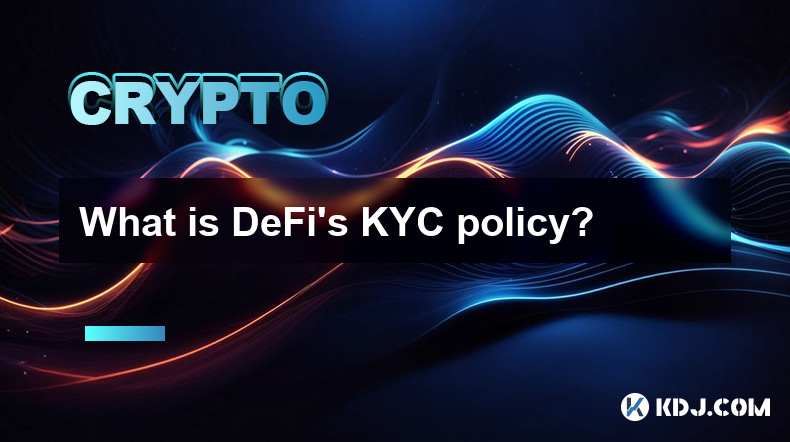
What is DeFi's KYC policy?
Feb 16,2025 at 03:51pm
Key Points:Understanding Decentralized Finance (DeFi)KYC Verification in DeFiBenefits and Drawbacks of KYC in DeFiNotable KYC-Compliant DeFi ProjectsTrends and Future of KYC in DeFiWhat is DeFi's KYC Policy?Decentralized Finance (DeFi) refers to a transformative financial ecosystem that operates on decentralized blockchain networks. Unlike traditional f...
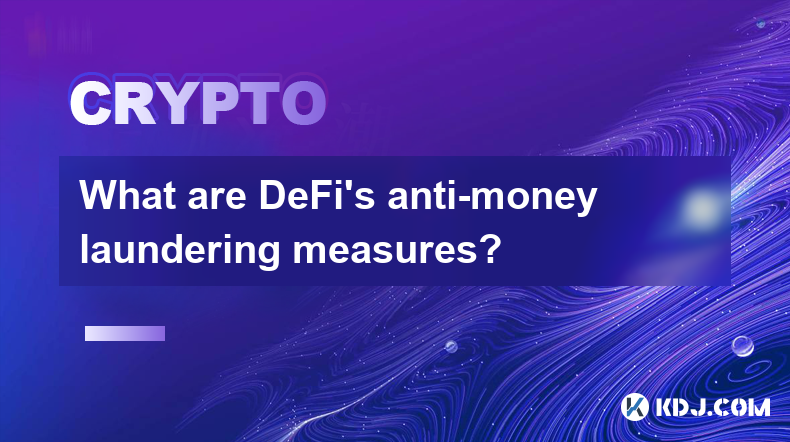
What are DeFi's anti-money laundering measures?
Feb 17,2025 at 07:19pm
Understanding DeFi's Anti-Money Laundering MeasuresKey Points:DeFi platforms utilize decentralized and pseudonymized transactions, posing unique challenges for AML compliance.Regulatory bodies are stepping up efforts to enforce AML regulations within the DeFi space.Various approaches and technologies are employed to combat money laundering in DeFi, incl...

What are DeFi's regulatory agencies?
Feb 16,2025 at 05:18am
Key Points:DeFi: Definition, Architecture, and Regulatory ChallengesRole of Decentralized Autonomous Organizations (DAOs) in Self-RegulationLegal Frameworks for DeFi in the United States and European UnionInternational Cooperation and the Global DeFi Regulatory LandscapeJurisdictional Issues and Considerations for DeFi EntitiesEnforcement Actions and Li...

What is DeFi's FATF policy?
Feb 17,2025 at 08:06am
DeFi's FATF Policy: A Comprehensive GuideKey Points:FATF's Definition of Virtual Assets and VASPsFATF's Recommendations for DeFi PlatformsFATF's Travel Rule and its Implementation in DeFiThe Impact of FATF's Policy on DeFi AdoptionFAQs about DeFi's FATF PolicyFATF's Definition of Virtual Assets and VASPsThe Financial Action Task Force (FATF) is an inter...

What is DeFi's CFT policy?
Feb 16,2025 at 11:54am
Key Points:Understanding CFT and its Significance in DeFiRegulatory Framework and KYC in DeFiImplementing AML/CFT Measures in DeFiProtocolsRole of Smart Contracts and Blockchain AnalysisChallenges and Future Developments in DeFi's CFT PolicyUnderstanding CFT and its Significance in DeFiCounter-Financing of Terrorism (CFT) is a crucial aspect of the cryp...

What is DeFi's AML policy?
Feb 15,2025 at 07:48pm
DeFi's AML Policy: Enhancing Compliance in the Crypto EcosystemKey Points:Understanding the Need for AML/CFT Compliance in DeFiChallenges and Limitations of DeFi AML PoliciesDecentralized Identity and Verification SolutionsSmart Contract Optimization for AML EnforcementCollaboration with Regulators and Law EnforcementUnderstanding the Need for AML/CFT C...

What is DeFi's KYC policy?
Feb 16,2025 at 03:51pm
Key Points:Understanding Decentralized Finance (DeFi)KYC Verification in DeFiBenefits and Drawbacks of KYC in DeFiNotable KYC-Compliant DeFi ProjectsTrends and Future of KYC in DeFiWhat is DeFi's KYC Policy?Decentralized Finance (DeFi) refers to a transformative financial ecosystem that operates on decentralized blockchain networks. Unlike traditional f...

What are DeFi's anti-money laundering measures?
Feb 17,2025 at 07:19pm
Understanding DeFi's Anti-Money Laundering MeasuresKey Points:DeFi platforms utilize decentralized and pseudonymized transactions, posing unique challenges for AML compliance.Regulatory bodies are stepping up efforts to enforce AML regulations within the DeFi space.Various approaches and technologies are employed to combat money laundering in DeFi, incl...
See all articles





















































































